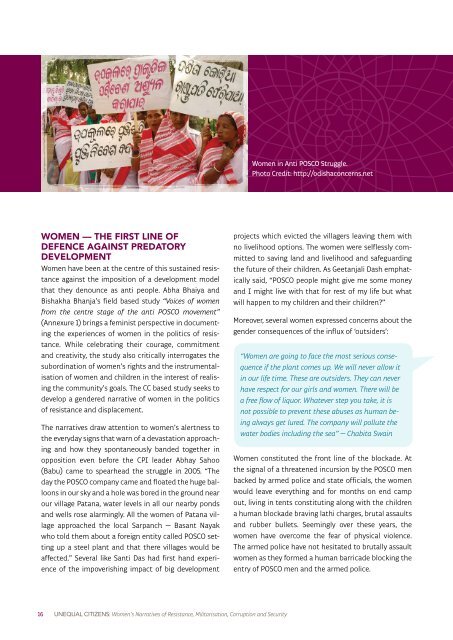CC_India
CC_India
CC_India
You also want an ePaper? Increase the reach of your titles
YUMPU automatically turns print PDFs into web optimized ePapers that Google loves.
Women in Anti POSCO Struggle.<br />
Photo Credit: http://odishaconcerns.net<br />
WOMEN — THE FIRST LINE OF<br />
DEFENCE AGAINST PREDATORY<br />
DEVELOPMENT<br />
Women have been at the centre of this sustained resistance<br />
against the imposition of a development model<br />
that they denounce as anti people. Abha Bhaiya and<br />
Bishakha Bhanja’s field based study “Voices of women<br />
from the centre stage of the anti POSCO movement”<br />
(Annexure 1) brings a feminist perspective in documenting<br />
the experiences of women in the politics of resistance.<br />
While celebrating their courage, commitment<br />
and creativity, the study also critically interrogates the<br />
subordination of women’s rights and the instrumentalisation<br />
of women and children in the interest of realising<br />
the community’s goals. The <strong>CC</strong> based study seeks to<br />
develop a gendered narrative of women in the politics<br />
of resistance and displacement.<br />
The narratives draw attention to women’s alertness to<br />
the everyday signs that warn of a devastation approaching<br />
and how they spontaneously banded together in<br />
opposition even before the CPI leader Abhay Sahoo<br />
(Babu) came to spearhead the struggle in 2005. “The<br />
day the POSCO company came and floated the huge balloons<br />
in our sky and a hole was bored in the ground near<br />
our village Patana, water levels in all our nearby ponds<br />
and wells rose alarmingly. All the women of Patana village<br />
approached the local Sarpanch — Basant Nayak<br />
who told them about a foreign entity called POSCO setting<br />
up a steel plant and that there villages would be<br />
affected.” Several like Santi Das had first hand experience<br />
of the impoverishing impact of big development<br />
projects which evicted the villagers leaving them with<br />
no livelihood options. The women were selflessly committed<br />
to saving land and livelihood and safeguarding<br />
the future of their children. As Geetanjali Dash emphatically<br />
said, “POSCO people might give me some money<br />
and I might live with that for rest of my life but what<br />
will happen to my children and their children?”<br />
Moreover, several women expressed concerns about the<br />
gender consequences of the influx of ‘outsiders’:<br />
“Women are going to face the most serious consequence<br />
if the plant comes up. We will never allow it<br />
in our life time. These are outsiders. They can never<br />
have respect for our girls and women. There will be<br />
a free flow of liquor. Whatever step you take, it is<br />
not possible to prevent these abuses as human being<br />
always get lured. The company will pollute the<br />
water bodies including the sea” — Chabita Swain<br />
Women constituted the front line of the blockade. At<br />
the signal of a threatened incursion by the POSCO men<br />
backed by armed police and state officials, the women<br />
would leave everything and for months on end camp<br />
out, living in tents constituting along with the children<br />
a human blockade braving lathi charges, brutal assaults<br />
and rubber bullets. Seemingly over these years, the<br />
women have overcome the fear of physical violence.<br />
The armed police have not hesitated to brutally assault<br />
women as they formed a human barricade blocking the<br />
entry of POSCO men and the armed police.<br />
16 UNEQUAL CITIZENS: Women’s Narratives of Resistance, Militarisation, Corruption and Security


